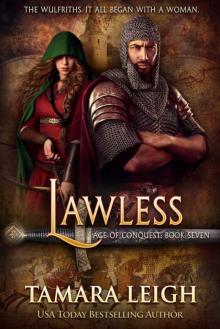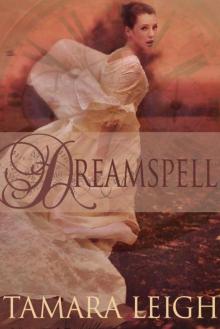- Home
- Tamara Leigh
The Redeeming: Book Three (Age of Faith) Page 2
The Redeeming: Book Three (Age of Faith) Read online
Page 2
“Accursed cur!”
Everard looked over his shoulder at his younger brother whose arrival on the training field was evident well in advance of his appearance. Noting the numerous rips in Abel’s clothing, Everard attempted to suppress the smile begging at his mouth.
Abel ground to a halt. “You think it funny?”
Trying to gain control of the larger smile that sought to crack his face wide, Everard turned back to the squires who had paused in their hand-to-hand combat to await further instruction.
He nodded for them to continue and returned his attention to Abel. “I do think it funny, little brother. Though, in the interest of brotherhood, I would prefer that I not win our wager, it seems I have done so yet again.” He tracked his gaze down Abel, tallying the number of times Christian Lavonne had found his mark. “At least a dozen strikes, and your instruction lasted half as long as it should have.” He held out a hand. “I have won.”
Abel glared at his outstretched palm. “Ill gotten gain,” he grumbled, then dug into the purse on his belt and slapped two pieces of silver in his brother’s palm.
“’Twas your wager.” Everard rubbed the coins together. “I but accepted, and reluctantly, if you recall.”
“Reluctant as a groom on his wedding night,” Abel scorned.
Though Everard was not one to make free with his emotions, he nearly laughed, for it was true he liked to wager, especially this brother who was determined to best him at every turn. Indeed, any moment now—
“A new wager!” Abel propped his hands on his hips.
“Methinks you ought to sleep off this one ere wagering more coin you can ill afford to lose.”
Abel gave his purse a shake. Satisfied with the jangle, he said, “On the morrow, Lavonne will land less than a dozen marks.”
“A mere dozen when this day he proved capable of such—and in half the time?” Everard shook his head. “A fool’s wager to make against a man who is progressing as well as he.”
Abel considered him, considered him some more, then blew a breath up his face that caused the dark hair on his brow to lift. “Aye, a fool’s wager. The knave has improved far better than expected. If he but set his mind to the taking of life, he might prove quite dangerous.”
Abel and his talk of death! If not that Everard shaved his head, he might drag a handful of hair from his scalp. “You know Garr does not approve of such means, Abel.”
“Godly Garr whose knees are surely worn out from the amount of time spent kneeling at prayer.” Abel glanced heavenward. “Not that I do not believe in showing the respect due God. It just seems unproductive to expend so much time conferring with the Lord who is more inclined to listen than respond.”
Everard narrowed his lids. “You think?”
“No more than you.” Abel looked pointedly at the knees of Everard’s breeches, the material of which was far from worn. “I suppose I should be grateful you do not seem to mind the manner in which I train those given into my charge—at least, the end result.”
Though Everard longed to deny it as he knew Garr would have him do, he could not, for there was a fierceness about the squires trained by Abel—one that made it difficult for other squires to best them. But never would Everard admit it.
Knowing it best to leave the subject be, he returned to the matter of the man whom the king was determined to make their brother-in-law. “What word would you have me send to Garr?” he asked for the dozenth time since Lavonne’s acceptance of the invitation to better his sword skill—a self-serving invitation to allow the Wulfriths to more closely observe the baron and determine whether or not to defy the king’s order to hand over Gaenor.
“Send word that, with much loathing, I concur that Christian Lavonne does not appear to be the same as his father or brother.”
It was as Everard had concluded from his own observations this past month. “You are surprised?”
Abel shrugged. “As you know, I was present when Baron Lavonne came to Beatrix’s aid.”
Mention of the attempt on the life of their youngest sister caused Everard’s insides to coil. Though it was true he had not been present, charged as he was with overseeing the training at Wulfen Castle since Garr had wed four years past, he knew what had transpired.
The worst of it was that Christian Lavonne’s illegitimate brother, Sir Robert, had done their father’s bidding to work revenge on a Wulfrith. If not for the dagger Christian had thrown with surprising skill, Beatrix would be dead. Instead, it was Sir Robert who had fallen. But just as Christian could not seek death now, neither could he then. Thus, the wounded Sir Robert languished in a London prison and would, hopefully, remain there until the end of his days.
The only pity of it was that Christian’s father, Aldous Lavonne, was too infirm to suffer the same punishment. For that, Everard and his family feared for Gaenor. The old man might be confined to bed, but when their sister went to live at Broehne Castle as Christian’s wife, Aldous would surely take every opportunity to work ill on her. Meaning something would have to be done about the old man. Given a say in the matter, Everard would have him removed to one of the barony’s lesser castles.
“It seems Gaenor is to wed,” Abel spoke across his brother’s thoughts.
Everard slid a hand over his shaved pate. “At least her groom is better able to defend himself at swords.”
“Well enough, I suppose. Of course, if there was some way to make him forget all that was poured into that monk’s head of his, he might do better than merely defend himself.”
Everard clapped a hand on his brother’s shoulder. “Then it is good, little brother, that you have a fortnight in which to remedy what ails your student.” Providing that Lavonne remained at Wulfen until the journey to Stern Castle to meet Gaenor at Beatrix’s wedding.
Lids narrowing, teeth baring, Abel said, “A month I have given him that should have been used for the betterment of my squires. I am done. If he requires further training, it falls to you.”
Though Abel surely expected an argument—indeed, was looking for one—Everard had already decided to relieve him of the task. “As you would have it.” He strode toward the squires whose hand-to-hand combat had progressed to the far side of the enclosure, his brother’s surprised silence following him.
“Everard!” Abel shouted.
Everard looked around.
“You”—Abel jabbed a finger in his direction—“are worse than Garr.”
“Aye. Anything else?”
Abel pivoted, causing a cloud of dust to rise in his wake.
Everard allowed himself a grunt of laughter, then glanced at the donjon visible above the castle walls. Wondering if today’s contest between Abel and Baron Lavonne had boasted an audience beyond those who patrolled the castle walls, he returned to his squires.
CHAPTER TWO
He should not be here—should not have allowed Sir Abel to provoke him to do something for which he was not ready. But he had come and had only to step within to renew a relationship he had allowed to sour upon attaining the title of Baron of Abingdale four years past.
As the priest intoned the morning mass to the gathered knights, squires, pages, and men-at-arms, Christian considered the chapel’s threshold and wished he could be like those within who had likely given little thought to crossing it.
He was not like them. He had been nearer God in the long, cool hours of monastery life—grudgingly, it was true, but he had found a measure of fulfillment in serving the Lord despite his resentment and yearning to be a warrior and lord the same as his brother, Geoffrey. However, he did not want to think there, for there lay the sin and shame that had caused him to give God his back as Abel Wulfrith had so coarsely put it on the day past.
Remembrance of their exchange made Christian’s pride recoil at giving the man the satisfaction of knowing his words had found their mark, and he nearly turned away. Setting his jaw, he stepped inside.
As the entrance was at the rear of the chapel, only a few of those nearest looked aroun
d. Curiosity flashed in the young men’s eyes, as it did when Christian appeared at supper, which was usually the only time he came amongst them. Certain they wagered over his identity and the reason one of obvious rank and nobility had come to Wulfen Castle, a stronghold devoted to training boys and young men, Christian eyed the back rows.
Left and right of the aisle, the squires and pages stood shoulder to shoulder, not a gap between them, meaning he would have to traverse the aisle to find a place. And likely draw the attention of the Wulfriths who were at the fore of the chapel. Reasoning that one need not number among the many to join in the mass, he chose the back wall that stood in shadow.
Though, over the next half hour, a few of the priest’s words slipped through the cracks of Christian’s barricaded soul, most went left and right of him. As tempted as he was to return belowstairs where a simple meal would be set out for breaking fast prior to the commencement of pre-dawn training, he forced himself to remain.
When the priest finally blessed those present and their endeavors, it took all of Christian’s will to not be the first to exit the chapel. During that struggle, he acknowledged what was happening—that he was under attack by the enemy who did not wish him here, who was content for him to remain outside of God’s will, who preferred the back turned to God over the face Christian sought to lift that he might once more find favor with the Lord. The enemy could not be more displeased with what Abel Wulfrith’s taunting had wrought.
Christian watched the others file out of the chapel from front to back and was grateful when neither of the Wulfrith brothers picked him from the shadows.
It did not take long for the chapel to empty, but even when the last of the squires had crossed the threshold, Christian remained unmoving. He watched the priest extinguish half the candles on the altar, then two of the three torches set in wall sconces.
Smoothing pudgy hands down his robes, the priest turned toward the door and, halfway across the chapel, paused. As if sensing Christian’s presence, he peered into the shadows, only to chuckle, shrug, and hasten forward. A moment later, he pulled the door closed behind him. The man’s lack of regard for his suspicions would have angered Christian if not that he would likely have done the same when his lot had been to pray, rather than fight.
All was different now. As he had learned these past years, if he was to protect his people and lands, he could not ignore such warnings. He must always be prepared for the blade at his back. Or another’s back, for which he had been prepared when his illegitimate half brother sought to slay Beatrix Wulfrith—Beatrix, whose death would have imperiled the cessation of hostilities between the Lavonnes and Wulfriths. Despite Christian’s intervention, until the Wulfriths entrusted their oldest sister to him, he could not be assured of reconciling with that family whose people had suffered much at the hands of his brothers and father.
“’Twill be done soon,” Christian murmured and settled his gaze on the altar. Prominently displayed there, despite the simplicity of the material from which it was fashioned, was a crucifix—a reminder of the one to whom he had turned when he was a man of God. More, a reminder of the one he had forsaken.
Was there a way to cross back to the other side of the divide he had placed between himself and God? Though a part of him longed to return to the relationship that, as a youth, he had forged out of adversity, the other part urged him to stay his course. Or was it the enemy?
Regardless, it was less burdensome to rely on one’s self rather than wait on the Lord who was not always forthcoming—and when He was forthcoming, did not always provide the answer one wished. Of course, had not God cruelly proved that only He knew what was best for those who followed Him? Was Geoffrey’s death not evidence enough?
Despite all of Christian’s arguments against what he knew must be done to ensure that the life he made with his wife and children would be blessed, he bowed his head. “I yield, Lord. Take me back.” And he would have walked the aisle and prostrated himself before the altar had the door not creaked open.
Closing his hand around his sword hilt, he peered out of the shadows at the figure in the doorway.
Seemingly as hesitant as he had been to cross the threshold, the hooded man finally stepped inside and closed the door.
Wondering if he should reveal himself or wait to determine the reason the intruder sought the chapel in the absence of those who had begun their day’s training, Christian flexed his hand on his sword.
Something was afoot, he determined as the tall man advanced on the altar. However, he was far from prepared when the hood was lowered to reveal a fall of dark blonde hair. Not a man, but a woman at Wulfen where women were forbidden. All except one who should no longer be here.
Gaenor Wulfrith stared at the cloth-covered altar. As it was always difficult to humble herself before the Lord, she imagined Jesus stretched on the crucifix before her.
Once more wrenched by His sacrifice that was said to forgive her of her sins, she lowered to her knees and bowed her head. Dutifully, she prayed for England, her family, her people, and those in need and hurting. Lastly, and with great apology, she prayed for herself—she whose prayers God seemed loath to answer.
She opened her eyes and considered the hands she clasped so tightly that the knuckles shone white. “I do not know why I even talk to You,” she whispered and lifted her gaze to the crucifix.
Months past, when it was believed her sister, Beatrix, had given her life that Gaenor might escape marriage to a Lavonne, Gaenor had refused to attend mass. Not until she learned her sister had survived had she returned to God, and only then to bargain with Him.
Beatrix, accused of murdering a knight, had once more faced death, and Gaenor had promised the Lord that if he delivered her sister free, she would return to Him. He had answered her prayer and, now absolved of the crime, Beatrix would wed the man she loved—unlike Gaenor who was tempted to fall away from the Lord now that she once more faced marriage to her family’s enemy. And revelation of her sin.
She shuddered. With each passing day that drew her nearer Beatrix’s wedding where she would meet her betrothed, the temptation to abandon God grew stronger, for it did not seem likely He would intervene.
Christian Lavonne had saved her sister—surely by trickery—and gained her family’s gratitude. Despite Gaenor’s protests, it was doubtful they would make any further attempt to keep her from wedding the baron. The Wulfriths would have their peace and she would suffer her husband’s abuses. Abuses he would surely justify once he discovered…
“Answer one more prayer, Lord, this one for me. Deliver me from this marriage. Preserve me for a man of integrity and honor, a man unlike the brother of that beast, Geoffrey Lavonne.” Beseechingly, she touched the base of the crucifix. “You know who I would have. You know where my heart lies, though his does not lie with me. Pray, grant me this.”
Christian stared at the woman’s back. Her softly spoken prayer having reached him in the great silence of the chapel, he curled his hands into fists. He knew she did not want him and might even hate him, but he had not considered that another might have claimed her heart—a man for whom she would yearn when she spoke vows with Christian, when he came to her, when she closed her eyes to imagine it was he who touched her.
For some reason, the ache went deep, and he rebuked himself, for he had no cause for jealousy when all he sought from their union was peace between their families.
Gaenor Wulfrith rose and swept around, affording him his first glimpse of a face that was told to be as distant from her sister’s as the dark of night was from the light of day. And it was, though not as expected. She did not possess Beatrix’s fragile beauty, but neither was she uncomely as he had been told. Dark blonde hair fell in waves about her warmly complected face to frame heavily-lashed eyes, a well-shaped nose, compressed lips that looked as if they knew no tilt or bow, and a firm chin. Severe, but possibly pretty.
As she neared, he looked closer. However, draped as she was in a long mantle, it was i
mpossible to determine if she possessed a pleasing figure. Overly slender, he guessed, likely little to distinguish her from a tall boy. Not that her figure was of import beyond her ability to bear children. Providing she was not narrow-hipped, which would making birthing difficult or even impossible, she ought to bear him many children.
He uncurled the fists he had made of his hands. Peace and children. That was all he required of Gaenor Wulfrith and, regardless of where her heart lay, he would have them.
She gripped the door handle and lowered her chin. Though the fall of her hair denied him her face, he sensed she wept, and a pang went through him that he did not wish to feel. In the next instant, she swung around. The eyes she narrowed on the altar were bright, but her face was dry.
“Regardless of Your answer,” she said, “I shall endure.” She wrenched open the door, paused, and frowned over her shoulder.
Christian tensed as she delved the shadows in which he stood. He had made no sound, but it was as if she felt him the same as the priest had done. However, also as the priest had done, she ignored her senses.
When the door closed behind her, he considered the altar before which he had thought to prostrate himself prior to Gaenor Wulfrith’s appearance. He had asked the Lord to take him back, but now he found he was not ready. One day he would return to his faith, but this day he would aspire to seek another’s death. And considering the great roiling within, perhaps this time he would succeed.
“What is this?” Christian looked from the heavily-stocked cellar before him to the knight at his side.
“Your new training field,” the second-born Wulfrith said.
Struggling toward patience, Christian said, “You will have to explain yourself, Sir Everard.”
Candlelight and shadow warring on the canvas of the knight’s austere face and shaved head, he said, “As Abel has done all he can do for you, ‘tis for me to impart the last of your training.”
“In a cellar?”
“There is no better place. Here you shall learn how to engage an opponent without benefit of light and open spaces, how to negotiate unseen obstacles, how to pick sounds from the silence, and how to discern the voice within that will one day save your life.”

 FEARLESS: Book Two: Age of Conquest
FEARLESS: Book Two: Age of Conquest BOUNDLESS: A Medieval Romance (AGE OF CONQUEST Book 6)
BOUNDLESS: A Medieval Romance (AGE OF CONQUEST Book 6) Lady Betrayed
Lady Betrayed Merciless
Merciless Nowhere, Carolina
Nowhere, Carolina Virgin Bride
Virgin Bride Blackheart
Blackheart Restless in Carolina
Restless in Carolina THE AWAKENING_A Medieval Romance
THE AWAKENING_A Medieval Romance Baron of Blackwood
Baron of Blackwood Leaving Carolina
Leaving Carolina HEARTLESS: A Medieval Romance (Age of Conquest Book 4)
HEARTLESS: A Medieval Romance (Age of Conquest Book 4) Baron of Godsmere
Baron of Godsmere Lady Of Eve
Lady Of Eve LAWLESS: A Medieval Romance (AGE OF CONQUEST Book 7)
LAWLESS: A Medieval Romance (AGE OF CONQUEST Book 7) Lady Of Fire AKA Pagan Bride
Lady Of Fire AKA Pagan Bride The Yielding (Age of Faith)
The Yielding (Age of Faith) The Redeeming: Book Three (Age of Faith)
The Redeeming: Book Three (Age of Faith) LADY UNDAUNTED: A Medieval Romance
LADY UNDAUNTED: A Medieval Romance THE RAVELING: A Medieval Romance (Age of Faith Book 8)
THE RAVELING: A Medieval Romance (Age of Faith Book 8) LADY EVER AFTER: A Medieval Time Travel Romance (Beyond Time Book 2)
LADY EVER AFTER: A Medieval Time Travel Romance (Beyond Time Book 2) Dreamspell
Dreamspell The Unveiling (Age of Faith)
The Unveiling (Age of Faith) THE RAVELING
THE RAVELING Splitting Harriet
Splitting Harriet Age of Faith 4 - The Kindling
Age of Faith 4 - The Kindling THE RAVELING_A Medieval Romance
THE RAVELING_A Medieval Romance Perfecting Kate
Perfecting Kate Misbegotten
Misbegotten THE VEXING: A Medieval Romance (AGE OF FAITH Book 6)
THE VEXING: A Medieval Romance (AGE OF FAITH Book 6) LadyOfConquest:SaxonBride
LadyOfConquest:SaxonBride